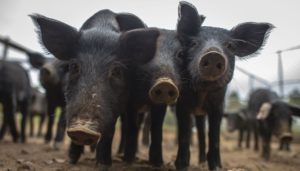The COVID-19 Crisis Exposes The Hidden Side Of The European Meat Industry
Meat production in Europe has long been a consolidated, vulnerable system. COVID-19 has exposed the foolishness of this approach.
| Meat production in Europe has long been a consolidated, vulnerable system. COVID-19 has exposed the foolishness of this approach. |

There has been extensive news coverage of the impacts coronavirus has had on the industrialized food system in the United States, primarily slaughterhouses and meat processing plants. These facilities, notoriously dangerous to begin with, have become incubators of disease due to their crowded working conditions and lack of adequate personal protective equipment and paid time off for workers. But it’s not just the US — slaughterhouses and processing plants around the world are responsible for outbreaks that have placed the lives of countless thousands at risk. As U.S.-style industrialized factory farming spreads across Europe, so do U.S.-style industrial slaughter and processing facilities. And while the European continent struggles to get out of the COVID-19 crisis, slaughterhouses are becoming burning centers of the disease.
The COVID-19 crisis has hit Europe really hard in the last months. Now that most countries are starting to relax the confinement measures and activate their economies, the meat industry is under the spotlight as a hotspot for virus transmission and as one of the main threats to Europe’s recovery.
Spain’s Pork Export Industry Hurts The People Who Have To Live Near The Operations
Spain became the world’s second largest exporter of pork (after the U.S.) in recent years. Food & Water Action Europe has been campaigning to stop the expansion of pig factory farms in Spain since 2017. With an exponential increase of Spanish exports of cheap pork, mainly to Asia, family farms are closing down and factory farms are popping up all over the country. As a result, thousands of people in rural areas cannot drink water from the tap and illegal manure spills are polluting rivers and aquifers. Food & Water Action Europe is working with rural communities to resist the expansion of the industry, with many new factory farms stopped and local bans being imposed across the country in the last years.
Just as has happened in the U.S., the expansion of factory farms has also resulted in the expansion of huge slaughterhouses and processing facilities.
Slaughterhouses Are A Prime Infection Hub
The meat industry was considered as an essential activity when the Spanish government approved the confinement of the population and the halt of most of the country’s economic activity. Now Spain is removing deconfinement measures and slowly coming back to normal activity levels, but regions around slaughterhouses might need to wait because of the skyrocketing number of COVID-19 cases in the plants and neighboring communities. One big outbreak was reported at a slaughterhouse in Binefar, Huesca, one of the biggest in Europe with a capacity for 32.000 pigs per day. 374 people, 30 percent of the staff, tested positive for COVID19. According to the Spanish Government, this is the biggest outbreak seen in recent weeks. The situation in the neighboring region of Catalonia is similar. New cases are emerging in the meat processing industry, which continued operations during the peak of the pandemic. Unions complained about lack of safety measures in facilities which have a track record of accusations of abusive and exploitative labour practices with – often undocumented – workers from Africa and Eastern Europe.
All around Europe the media is reporting similar situations. Ten outbreaks have been reported in meat-processing plants in Ireland with 566 staff infected. One-third of the staff of a meat plant in Tipperary, Ireland, tested positive for the virus in a plant that belongs to Rosderra, the largest pork-processing company in the country. Similar news in France, where 100 confirmed cases were found recently in two slaughterhouses in the western part of the country.
German slaughterhouses became one of the sources of COVID-19 infections in the country, with a plant in North Rhine-Westphalia reporting that 200 out of their 1,200 employees tested positive. The German meat industry has been accused of employing low-wage workers from Eastern Europe. As in Spain, their working conditions have been reported as “modern slavery”. The situation has forced the German government to announce a ban on the use of temporary workers at slaughterhouses effective January 2021.
These Outbreaks Prove That The Way We Produce Meat Has To Change
This situation is exposing the worst part of years of vertical integration, industry consolidation and public policies that supported a livestock farming model based on factory farms. Food & Water Action Europe is asking national and European authorities to fundamentally change the way we produce food in Europe. We urgently need to relocalize food production and distribution and return to the sustainable small-scale model of livestock farming that is still at the heart of the European identity.
The coronavirus has exposed our industrialized food system at its worst — in the US, and also throughout Europe. This system does not value workers or the communities they live in — these corporate interests only value their own bottom line, and this crisis has made that appallingly clear. In Europe and in the U.S., it’s never been more clear: we need to overhaul the fundamental structure of our food system. People’s lives depend on it.
SHARE ON FACEBOOK


